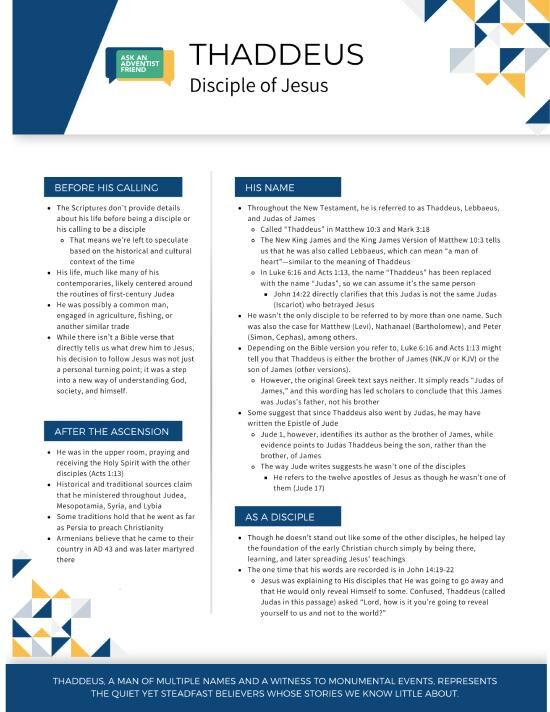Thaddeus (or Thaddaeus) is one of the more unique and obscure figures among Jesus Christ’s disciples in the New Testament.
Though we know little about him from the Bible or tradition, we do know that he went by a few names, specifically Thaddeus, Lebbaeus, and Judas of James.
As we piece together the small tidbits about Thaddeus, let’s see what these names tell us about him and what we can learn from his life.
We’ll look at:
Thaddeus’s name(s)
 The different Gospel accounts present Thaddeus with different names. In Matthew 10:3 and Mark 3:18, he’s listed as “Thaddeus.” But in Luke 6:16 and Acts 1:13, the name “Thaddeus” is excluded completely, and we find someone named “Judas” instead. For this reason, we can safely assume they’re the same individual.
The different Gospel accounts present Thaddeus with different names. In Matthew 10:3 and Mark 3:18, he’s listed as “Thaddeus.” But in Luke 6:16 and Acts 1:13, the name “Thaddeus” is excluded completely, and we find someone named “Judas” instead. For this reason, we can safely assume they’re the same individual.
And John 14:22 directly clarifies that this Judas is not the same Judas (Iscariot) who betrayed Jesus.
But these names aren’t just a case of mistaken identity or a biblical typo. They’re a glimpse into the naming conventions in ancient times.
Some suggest that Judas was his real name. Then, “Thaddeus,” his surname or family name (Matthew 10:3), would have distinguished him from Judas Iscariot, the betrayer of Jesus.
Just as some of us might go by nicknames or middle names in different settings, Thaddeus’s multiple names may have reflected various aspects of his identity or role within the community. According to Thayer’s Greek Lexicon, Thaddeus can mean “large-hearted or courageous.”1 In Bible times, names were often given based on character qualities (Genesis 32:28; Hosea 1:4-11), and this would’ve been no different.
The New King James and the King James Version of Matthew 10:3 tells us that he was also called Lebbaeus. Lebbaeus can mean “a man of heart”—similar to the meaning of Thaddeus.2
And Thaddeus wasn’t the only disciple to be referred to by more than one name. Such was also the case for Matthew (Levi), Nathanael (Bartholomew), and Peter (Simon, Cephas), among others.
But we still have some mysteries to explore—like who was Thaddeus related to according to the Bible? Was he connected to the disciple James, the son of Alphaeus? And did he write the book of Jude?
More on those next.
Son or brother of James? And, which James?
Depending on the Bible version you refer to, Luke 6:16 and Acts 1:13 might tell you that Thaddeus is either the brother of James (NKJV or KJV) or the son of James (other versions).
However, the original Greek text says neither. It simply reads “Judas of James,” and this wording has led scholars to conclude that this James was Judas’s father, not his brother.3
So, is this James the same as any of the other ones listed in the Bible? In Luke 6:15-16, James the son of Alphaeus (aka “James the Less”) is mentioned. Could they be related?
Adventist scholars don’t believe so:
“Almost certainly this James, the father of Thaddaeus or Judas, is not to be identified with any other James of the NT, for the name was very common.”4
(And the name James remains common, even today!)
The Judas who wrote the Epistle of Jude?

Photo by Tim Wildsmith on Unsplash
Jude, the title of an epistle in the New Testament and the name of the author who wrote it, is the same as the name Judas. This has led some to wonder whether the disciple Judas Thaddeus, also known as “Jude the Apostle,” might’ve written the book of Jude.
The Seventh-day Adventist Bible Dictionary offers a different perspective. It suggests that the author of Jude—who may have been the brother of Jesus (Matthew 13:55; Mark 6:3)—and Judas the disciple are two different people.5
Jude 1 identifies its author as the brother of James, while evidence points to Judas Thaddeus being the son, rather than the brother, of James. What’s more, the way Jude writes suggests he wasn’t one of the disciples. He refers to the twelve apostles of Jesus as though he wasn’t one of them (Jude 17).6
So, now that we know a little more about Thaddeus’s name, let’s see what we can learn about him as a person.
Thaddeus before his calling

Photo by Korhan Erdol
The Scriptures don’t provide details about Thaddeus’s life before being a disciple or his calling to be a disciple. That means we’re left to speculate based on the historical and cultural context of the time.
Thaddeus’s life, much like many of his contemporaries, likely centered around the routines of first-century Judea. He was possibly a common man, engaged in agriculture, fishing, or another similar trade.
In those times, the Jewish people were under Roman occupation, which meant dealing with taxes and soldiers while also trying to uphold the rich customs and laws of Judaism. Like the other Jews, Thaddeus would’ve longed for the coming of the Messiah to end the Roman occupation.
So, what might have drawn Thaddeus to Jesus?
While there isn’t a Bible verse that directly tells us, there are many likely possibilities. Perhaps he felt discontent with the status quo and wanted something beyond the stagnant rituals of the Jews. Maybe it was the Roman oppression that made the message of a new kingdom, one based on love and justice, so appealing. Or it could have been the miracles and teachings of Jesus, stories of which were undoubtedly spreading across the regions.
Thaddeus’s decision to follow Jesus was not just a personal turning point; it was a step into a new way of understanding God, society, and himself.
Thaddeus as a disciple
Once Thaddeus decided to follow Jesus, he became a key player in a story that would shape the course of history. Though he doesn’t stand out like Peter or John, he was still part of the core team—those dozen men who were the first to hear Jesus’ teachings and witness His miracles.
Being a disciple wasn’t just about being front and center; it was about being part of the support system, the group that carried the message of Jesus to the masses. Thaddeus helped lay the foundation of the early Christian church simply by being there, learning, and later spreading Jesus’ teachings. He reminds us that sometimes, the most profound impact is made not by words but by presence and perseverance.
The one time that Thaddeus’s words are recorded is in John 14:19-22. Jesus was explaining to His disciples that He was going to go away and that He would only reveal Himself to some. Confused, Thaddeus (called Judas in this passage) asked:
“Lord, how is it you’re going to reveal yourself to us and not to the world?” (John 14:22, CSB)
His question revealed the mindset he shared with all the other Jews: the hope of a Messiah who would reveal Himself to the whole world and conquer the Jews’ enemies. Here’s how some Bible commentators put it:
“Judas doubtless had in mind a visible manifestation of glory such as was expected to attend the advent of the Messiah. It was apparently disappointing to him that the manifestation was to be made to only a few…. In common with his Jewish compatriots he doubtless shared the hope that the Messiah would manifest Himself in judgment over the Gentiles and in the re-establishment of the spiritual theocracy.”7
Like the other disciples, Thaddeus had to slowly unlearn all he’d expected the Messiah to do. Jesus’ ministry was so different from what he’d been waiting for. But over time, he would come to understand and become a strong witness for the Gospel.
Thaddeus after the ascension

Photo by Jeremy Yap on Unsplash
After Jesus’ ascension, Thaddeus was in the upper room, praying and receiving the Holy Spirit with the other disciples (Acts 1:13). From there, we know nothing more about him except what various historical and traditional sources suggest.
Let’s take a look at those.
Oral church tradition claims that he ministered throughout Judea, Mesopotamia, Syria, and Lybia.8
And some traditions hold that he went as far as Persia to preach Christianity.9 This is the tradition mentioned in Foxe’s Book of Martyrs:
“Being sent to Persia, he wrought many miracles and made many converts, which stirring up the resentment of people in power, he was crucified in the year 72 after Christ.”10
On the other hand, Armenians believe that Thaddeus came to their country in AD 43 and was later martyred there.11
But regardless, his presence at Pentecost suggests that he continued the work he started with Jesus. He likely traveled, spreading the teachings of Christ, and played a crucial role in establishing early Christian communities.
Thaddeus—quiet yet steadfast
Thaddeus, a man of multiple names and a witness to monumental events, represents the quiet yet steadfast believers whose stories we know little about.
His journey with Jesus is a reminder that every follower, regardless of their role’s prominence, contributes significantly to the spread of the Gospel message.
Curious about the others who walked with Jesus?
Continue your journey through history and faith by exploring our series on the lives of the disciples.
Related pages
- “Lexicon :: Strong’s G2280 – thaddaios,” Blue Letter Bible. [↵]
- “Lexicon :: Strong’s G3002 – lebbaios” Blue Letter Bible. [↵]
- Seventh-day Adventist Bible Commentary, vol. 5, p. 597. [↵]
- Ibid. [↵]
- Horn, Siegfried, Seventh-day Adventist Bible Dictionary, Revised Edition, p. 630. [↵]
- Ibid. [↵]
- Seventh-day Adventist Bible Commentary, vol. 5, comments on John 14:22. [↵]
- “Jude the Apostle,” New World Encyclopedia. [↵]
- “St. Jude,” Britannica. [↵]
- Foxe, John, Foxe’s Book of Martyrs, p. 34. [↵]
- “Saints Thaddeus and Bartholomew,” The Armenian Prelacy. [↵]
More Answers
Who is Mary Magdalene in the Bible?
Mary Magdalene was a remarkably dedicated follower and supporter of Jesus Christ during His earthly ministry.
Getting to Know Mark—Gospel Writer and Follower of Jesus
Mark (whose full name was John Mark) had a lot of roles in the New Testament: he was an early follower of Jesus Christ, he traveled the Mediterranean as a Christian missionary, and he wrote a book of the Bible.
Understanding Luke: The Beloved Physician, Historian, and Evangelist
Who was Luke in the Bible? What was he known for and what contributions did he make for the early church? Find out here.
Exploring the Life of the Apostle Paul
The apostle Paul went from Pharisee to Christian after a miraculous encounter with Jesus. He spent the rest of his life spreading the Gospel and writing words we still read today.
All About the Disciple, Simon the Zealot
“Simon the Zealot” was one of the 12 disciples chosen by Jesus Christ. But despite this important role, the New Testament doesn’t provide specific details about his life, family, job, etc.
Judas Iscariot, the Most Infamous Disciple of Jesus
Judas Iscariot is best known for betraying Jesus with 30 pieces of silver. This page looks more closely at who he was and what led him to do so.
Matthew—From Tax Collector to Jesus’ Disciple
In the first book of the New Testament, we find the Gospel story from the perspective of Matthew. He was a Jewish tax collector from Capernaum in the first century AD, and he was likely despised by fellow Jews for choosing that profession.
Who Was Jesus’ Disciple Named James, Son of Alphaeus?
Two of Jesus’ 12 disciples were named James. While more is known about James the son of Zebedee and brother of John, let’s see what there is to know about the other James, known as James the son of Alphaeus—also sometimes referred to as “James the Lesser.”
What the Bible Tells Us About Thomas the Apostle of Jesus
You might know him as “Doubting Thomas” because he refused to believe in Jesus Christ’s resurrection without first seeing Jesus.
All About the Disciple James, Son of Zebedee
James the son of Zebedee was a fisherman who became Jesus’ disciple. Discover how his decision to follow Jesus shaped his life and the beginnings of the early Church.
Who was the Apostle John?
What does the Bible say about the apostle John? What is he known for today? Learn more about John’s life, ministry, and legacy here.
All About Bartholomew, a Disciple of Jesus
Even before Bartholomew met Jesus, he was eagerly awaiting the arrival of the Messiah. Discover how he came to follow Jesus and what his discipleship means for us today.
What Do We Know About Andrew the Disciple?
Andrew was Jesus Christ’s first disciple (John 1:37-40) and the first to recognize Him as the Messiah.
Simon Peter: Fisherman to Disciple to Apostle
Simon Peter was a simple fisherman who became one of the most well-known disciples of Jesus Christ. He is perhaps best known for being part of Jesus’ inner circle of three disciples, walking on water, and proclaiming Jesus as the Son of God.
Who Was Philip the Disciple In the Bible?
Philip was one of the 12 disciples called by Jesus Christ during His earthly ministry. He was originally from the city of Bethsaida and to this day is often known as the “practical disciple.”
King David: How Was He a Man After God’s Own Heart?
War, bloodshed, murder, adultery—all of these crimes overshadowed the life of a biblical Old Testament man named David. Yet he was called a man after God’s own heart, not to mention one of Israel’s greatest heroes and kings.
The Story of Moses in the Bible: What His Life Teaches Us
A baby on death row, an outcast prince, a humble shepherd, and an unlikely deliverer. All these titles describe the individual that led Israel out of slavery in Egypt to the borders of the Promised Land.
The 42 Kings (and 1 Queen) of Israel and Judah in the Bible
Conspiracies, royal scandals, dictatorships—history is full of them. And Bible history is no different when we stop to look at the kings of ancient Israel in the Old Testament.
Who Were the Israelites in the Bible?
The Israelites in the Bible, also known as the children of Israel or ancient Israel, were a nation God called to represent Him to the world. As recorded in the book of Exodus, He delivered them from slavery in Egypt under Moses’s leadership and brought them to the Promised Land of Canaan (located in a similar area to present-day Israel).
What We Can Learn from the Life of Joshua
Joshua was an iconic leader in the Old Testament of the Bible. As a successor to Moses, he was both a humble servant of God and a strong warrior. God called Him to lead the nation of Israel to take possession of Canaan, the Promised Land—a task he took on with faith and courage.
Why is Abraham Important in the Bible?
God communicated directly with Abraham and made a covenant with him that would provide land, protection, and fruitfulness for his descendants. And he indeed became the father of many nations, making him a foundational figure in three monotheistic world religions: Judaism, Islam, and Christianity (Genesis 17:5, 19-20; Genesis 25:1-6, 12-18).
Who Were the Judges of Israel in the Old Testament?
Times of crisis call for men and women of action. The Israelites, newly settled in the Promised Land, found themselves in those times. As enemy nations attacked and oppressed the tribes, they cried out to God for help. He, in turn, sent them men and women of action—known as judges.
Life Lessons from Joseph in the Bible
Joseph is one of the more well-known people from the Bible’s Old Testament. He showed remarkable strength, faith, and patience—even while facing great difficulty and injustice. All because he let God lead.
Didn’t find your answer? Ask us!
We understand your concern of having questions but not knowing who to ask—we’ve felt it ourselves. When you’re ready to learn more about Adventists, send us a question! We know a thing or two about Adventists.



























